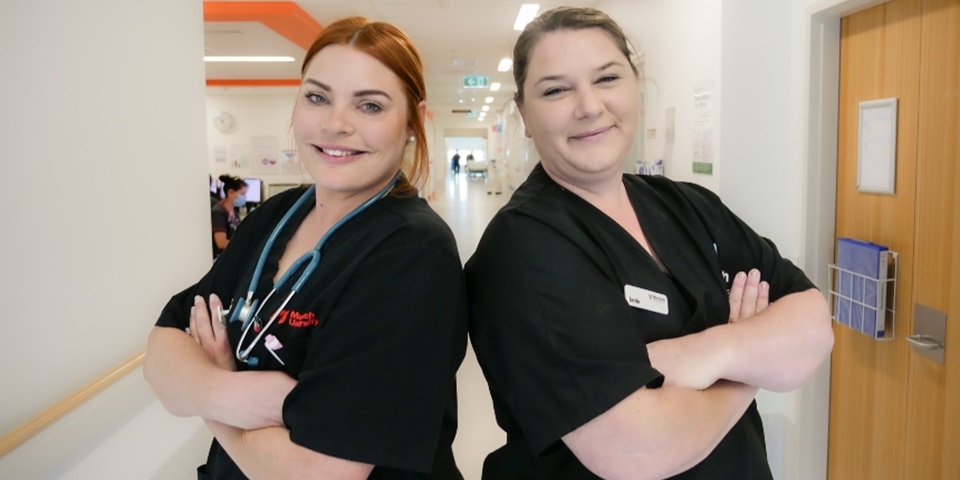News
First Nations nursing students the face of culturally safe healthcare

A unique partnership program between Murdoch University and Fiona Stanley Fremantle Hospitals Group is nurturing a cohort of future First Nations nurses to champion Indigenous perspectives and knowledges in Australia’s healthcare system.
Moorditj Kaartdijin, Moorditj Warlang - which translates to “good/strong knowledge, good/strong health” - is a training program first developed in 2020 by the Murdoch School of Nursing.
As part of their nursing course, Murdoch students are required to participate in practical assessments to gain the necessary experience to become a registered nurse.
Helen Dugmore, Murdoch University Associate Dean Clinical Education and Engagement in the School of Nursing, said the partnership ensures First Nations students gain ongoing experience at the same hospital, therefore developing a stronger connection with their environment.
“The students can become familiar with the staff, patients, and the workplace culture of the hospital, so they can reach their full potential and succeed in their work,” she said.
Associate Professor Caroline Nilson, Murdoch University Aboriginal Research Lead in the School of Nursing, said Aboriginal and Torres Strait Islander nurses are underrepresented in the health workforce and the Murdoch School of Nursing is committed to creating culturally safe learning experiences for students through the partnership.
First Nations peoples have long requested to have Indigenous health practitioners caring for them, and to address the shortage we have understood the importance of providing a partnership program to support cultural safety throughout their studies.”
Associate Professor Caroline Nilson
Fiona Stanley Fremantle Hospitals Group Executive Director Neil Doverty explained the importance of having a culturally diverse and inclusive hospital workforce representative of the local community, especially for patients who may feel more comfortable receiving care from a culturally familiar healthcare worker.
“Having a diverse workforce is essential to best understand the needs of our patients and create an environment where both staff and patients feel safe and comfortable,” Neil said.
“This is why we are proud to have partnerships in place like this, to ensure culturally safe healthcare, including by helping provide Aboriginal student nurses the highest degree of practical experience and promoting our hospitals as a workplace of choice when they graduate.
“Our participation in this partnership is thanks to the hard work and collaboration of our FSFHG Nursing and Midwifery Education team, our South Metropolitan Health Service Aboriginal Health Strategy team, and of course our supervising registered nurses, many of whom are SMHS Aboriginal Health Champions.
“I am proud of our strong relationship with Murdoch University and look forward to seeing our partnership continue to grow to facilitate many more Aboriginal Australians join us in their practical university learning and hopefully, later in their employment!”
Nursing student Jayde Larson said the Moorditj Kaartdijin, Moorditj Warlang program has provided an opportunity to gain valuable knowledge, link theory to practice more efficiently, and build professional relationships in her field.
“The team involved in the workings of the partnership are supportive and they consistently ensure that we have a say in how the program runs so it remains culturally appropriate,” she said.
“Aboriginal and Torres Strait Islander people do not always have the same opportunities to access healthcare, especially in the rural and remote areas of the State, and quite often, when they do seek healthcare, misunderstandings can be experienced by both parties,” she said.
“By having a workforce that is strong in its Indigenous healthcare workers, all patients can have the opportunity to feel safe, their culture respected, and receive the healthcare that we are all entitled to.”
Nursing student Peta Clifford said the program has provided incredible insights into the real-world work of a registered nurse.
“I have been able to harness various skills, strengthen clinical knowledge and link my university teachings to practice,” she said.
“This partnership has also allowed me to gain a wide range of insight and expertise from different staff members I've worked alongside over both hospital locations, further strengthening my confidence, clinical knowledge, and enthusiasm to delve into this career of lifelong learning.
I have come to love working at Fiona Stanley Hospital, where the majority of my placements have been, and I am excited to see where the future will take me upon graduating.”
Nursing student Peta Clifford
Ms Clifford said she is inspired and welcomed by the nurses who she works alongside every day, which is a big reason why she has developed strong communication and clinical skills.
“My experience in this partnership with Murdoch has also been outstanding, the staff have held events that have allowed me to interact with other students apart of the program, and through this, I have developed some incredible lifelong friendships.” Learn more about the incredible opportunities on offer at Murdoch's School of Nursing.
News
First Nations nursing students the face of culturally safe healthcare
Posted on